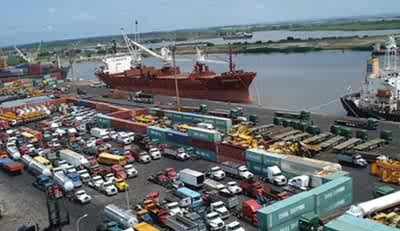The Federal Government, through the Presidential Enabling Business Environment Council (PEBEC), has approved the reduction of documentation procedures of imports and exports in Nigerian ports.
Mr Anthony Ayalogu, a Deputy Comptroller of Customs and Desk Officer in charge of Ease of Doing Business, disclosed this at a two-day sensitisation workshop on Ease of Doing Business Reform held on Thursday in Ikeja, Lagos.
The News Agency of Nigeria (NAN) reports that the workshop is meant to help improve Nigeria’s ranking in the World Bank’s Doing Business Index in 2018.
Ayalogu explained that documentation of imports had reduced from 14 to eight stages, while export documentation had reduced from 10 to seven.
According to him, Cargo Release Order, Manufacturers’ Certificate of Production, Payment Receipt of Customs Fee; among others, have been removed from documentation.
Ayalogu said the new imports and exports procedures include: palletising all containerised consignments coming into Nigeria for easy clearance.
He said: “Used spare parts must be packed in cases and the cases would be packed in pallets.
“The packing list of the containers must be itemised as the goods are arranged in the containers.
“Vehicles imports should have the complete 17 digits Vehicle Identification Number (VIN) inscribed on the Bill of Lading. All form `M’ goods should have the Form `M’ number stated on the Bill of Lading.
“All diplomatic goods should be indicated on the Bill of Lading,’’ he said.
Dr Jumoke Oduwole, the Senior Special Assistant to the President on Industry, Trade and Investment, had earlier said trading across borders involved obtaining credits, paying taxes and having access to electricity supply.
According to her, these are key indices of the reforms initiated by PEBEC.
Oduwole said the reform was basically to transform Nigeria to a progressive and easier place of doing business and to move the country 20 steps ahead in ranking in terms of ease of doing business.
She also said that PEBEC had implemented an upgrade of the Corporate Affairs Commission (CAC) online portal to ensure document upload capabilities.
Oduwole said this would create room for new businesses to be fully registered online without having to visit the CAC office.
“The PEBEC is supported by a small-scale task force responsible for driving the reform agenda and ensuring implementation across Ministries, Departments and Agencies (MDAs).
“Nigeria ranked 169 out of 190 on Doing Business Ranking of the World Bank. In trading across borders, is a worse indicator as Nigeria ranks 182 out of 190.
“This administration has taken it upon itself to work with government agencies to introduce palletised containers of imports,’’ Oduwole said.
She said that the whole idea is to make business more convenient for processing of both exports and imports.
Mr Sule Alu, an Assistant Comptroller-General of Customs in charge of Tariffs and Trade, said the forum was meant to improve Customs mandate on trade facilitation.
Alu said that the idea of the reform was to engage stakeholders in the operations of “Ease of Doing Business’’.
He said that the reform was a holistic approach which needed everyone’s participation for government to achieve its mandate of reducing the time of doing business at the ports.
Also speaking, the Customs Area Comptroller, Tin-Can Island Customs Command, Comptroller Umar Bashar, urged both Customs officers and stakeholders to continue to display transparency in cargo clearance processes.
Bashar said that before now, cargo were palletised but now nobody cares about how the cargo would be processed until the consignments were damaged before getting to the ports of destination.
“We are giving opportunities to the shipping companies to just dump cargo in Nigerian ports because we do not care about world best practices.
“Ease of Doing Business is all about transparency, integrity of data and having the love of the country at heart,’’ Bashar said.
The controller, however, implored stakeholders to improve on training in order to spend less time on cargo clearance. (NAN)




 Premier League
Premier League